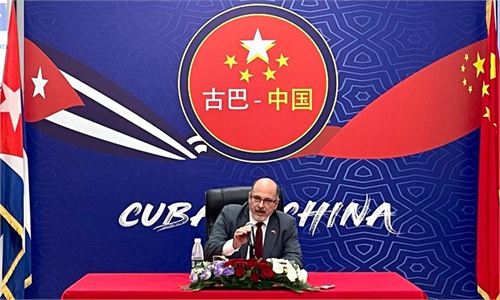Inclusiveness, win-win development reasons for BRI success: MexCham vice president

In the Mexican city of Cancun, the Maya railway project is advancing on July 8, 2023. The project is carried out with help from a Chinese infrastructure company. Photo: IC
Editor's Note:This year marks the 10th anniversary of the Belt and Road Initiative (BRI) proposed by Chinese President Xi Jinping. Through the lens of foreign pundits, we take a look at 10 years of the BRI - how it achieves win-win cooperation between China and participating countries of the BRI and how it has given the people of these countries a sense of fulfillment.
The Mexican Chamber of Commerce in China (MexCham) vice president Victor Cadena (Cadena) shared his views in an interview with Global Times (GT) reporter Qian Jiayin. He believes that the core values of the BRI, which embody inclusiveness and win-win development, provide a prosperous foundation for long-term cooperation between Chinese and Mexican enterprises.
This is the 14th piece of the series.
GT: How do you evaluate the achievements and impact of the BRI? The circle of friends who are jointly building the BRI has expanded to 21 countries in Latin America. In your opinion, why is this initiative becoming increasingly popular in Latin America?
Cadena: The BRI has been successful because its core values are inclusiveness and win-win development. Solid institutions such as the Asian Infrastructure Investment Bank (AIIB) have been created to finance cross-border infrastructure and multiple projects while fostering multilateral trade not just between China and the corresponding country but globally. MexCham actively participates in forums and exhibitions related to some BRI, and the BRI has provided convenience for Mexican companies to come to China.
GT: MexCham has been established for 16 years, and you have witnessed the development of China-Mexico economic and trade relations after the implementation of the BRI. What changes has the BRI brought to the MexCham?
Cadena: Mexico and China are old partners and friends. This year, we celebrate the 51st anniversary of diplomatic relations and the 16th anniversary of MexCham. Bilateral trade has been growing year on year, and last year our bilateral trade was around $130 billion, the highest record ever, compared to $86.6 billion in 2021. Hence, China is Mexico's second largest trading partner globally, just behind the US, and Mexico is China's second largest trading partner in Latin America, with Brazil being its largest in the region.
GT: What advantages does the BRI provide for Mexican companies to develop in China?
Cadena: The Mexican government has not formally endorsed the BRI, and Mexico is not a member of the AIIB. The reasons are mainly related to geopolitics; however, as I mentioned, Mexico and China have very close political and economic relations. Proof of that is our bilateral trade, which has been growing year on year and last year was $130 billion, the highest ever. This amount is much larger than the bilateral trade between China and other Latin American countries with whom China has Free trade agreements (FTA).
Mexico and China do not have an FTA with each other, but we do have different bilateral instruments that provide legal certainty for bilateral trade and investments, such as a bilateral treaty for avoiding double taxation and a bilateral treaty for protecting bilateral investments, just to mention a few. In addition, Mexico and China have elevated their relations to the level of "comprehensive strategic partnership," which is a special category given by the governments of both countries.

Victor Cadena Photo: Courtesy of Cadena
GT: The US has always concocted various arguments to smear China's economic activities in Latin America, such as "debt traps," China's so-called expanding influence in Latin America and plans to build military facility. How much do you think these arguments can affect China-Latin America's economic cooperation? Will countries in Latin America buy into these arguments?Cadena: Mexico is an independent, sovereign, autonomous country, and a member of international organizations such as the UN and WTO. Mexico has solid and mature economic and political relations with all countries worldwide, including China and the US. There are no foreign troops from any country in Mexico. A clear evidence of Mexico's peaceful and solid relations with both the US and China is the fact that the US and China are Mexico's largest trading partners.
The main trading partner of Latin America is China; in most countries in Latin America, China ranks as the largest or second-largest trading partner and source of foreign direct investment. These facts show the relevance of China in Latin America. This trend is more likely to continue in the short and medium term.
GT: What are the differences between China and the US in the approaches of conducting economic and trade cooperation with Latin America?
Cadena: According to the US official figures, in the first six months of 2023, the US' largest trading partner was Mexico. Before Mexico, this position was held by China. This position is probably temporary and will likely change somewhere in the future. The so called US-Mexico-Canada Agreement, formerly called the North American Free Trade Agreement, has been in force for almost 30 years and provides a mature platform for companies manufacturing, assembling, and trading goods and services in the North American region.
In fact, thousands of Chinese companies have been settled in Mexico over the last three decades, and in particular, over the last 3 years, there has been a new wave of Chinese companies arriving and eager to establish their offices and plants in Mexico as a consequence of the so called near-shoring effect. In a similar way, more and more Mexican companies and businesses are coming to China. In this sense, Mexico provides a mature and competitive platform for Chinese and foreign companies to manufacture or assemble their products and later export them to the US with zero tariffs due to the FTA. This is a win-win situation, as I consider Mexico and China to be complementary economies. In terms of exports, Mexico is different than most Latin American countries in the sense that a large amount of its exports are manufactured rather than primary, non-processed goods.
Cadena: Beyond the growing and huge bilateral trade between Mexico and China, I believe there is still more room for development in terms of communication between China and Mexico in several aspects. Cultural and academic exchanges are also important. Like China, Mexico is also a millennial civilization with a rich history and culture and is also the largest Spanish-speaking country worldwide. Before COVID, Mexico was the first country in Latin America with direct passenger flights to China. These flights haven't resumed, but we hope they will soon, as people's connectivity is very important. Mexico was also the most visited country in Latin America by Chinese tourists. Mexico ranks among the top 10 most visited countries, and the tourism industry is very well developed. Political exchanges are permanent and fluent. I trust our trade, political and cultural exchanges will continue growing in the years to come.
MexCham participates actively in trade and investment exhibitions and summits all over China. As an example, over the last few weeks, we headed a 30-member Mexican business delegation to Changsha, Hunan Province. In September, with Mexican companies we participated in the China International Fair for Trade in Services (Beijing) and China International Fair for Investment and Trade (Xiamen) with a Mexican pavilion, and business conferences in Anhui and Shandong. In August, in Mexico we received a delegation from Chongqing, and in October we will receive another from Shandong. I am very confident and positive about the Mexico-China relationship; we are old friends and good partners. We look forward to more Mexican companies in China and more Chinese companies in Mexico. Win-win long-term cooperation is the foundation for mutual sustainable growth and prosperity.



